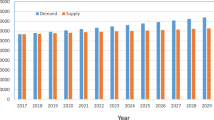Abstract
Extraordinary economic forces are influencing graduate medical education in this country. Federal, state, and third party cost containment efforts, managed care, medical student loan indebtedness, and decreasing governmental and industry enthusiasm to support residency training are producing significant external pressures on academic health centers, recruitment into psychiatry, and on the practice of psychiatry. Other pressures on the psychiatry residency curriculum are being generated from the rapid expansion in our scientific knowledge base in clinical psychiatry and the influence of subspecialization. The future psychiatrist will be trained for a life long career in continuing education to accommodate for the explosive scientific contributions to our field. The residency training program will promote the ability to think scientifically, to teach others, to administrate and lead, and to achieve clinical competence in a more rigorous fashion. Regardless of the number and forms of emerging practice settings, it is best to train our residents for flexibility through emphasizing fundamental clinical and scientific excellence.
Similar content being viewed by others
References
Medicare chief pleads for new ways to fund GME. American Medical News, May 20, 1991.
Petersdorf, R.G.: A proposal for financing graduate education. New England Journal of Medicine 312:1322–1324, 1985.
Rieselbach, R.E., Jackson, T.C.: In support of linkage between the funding of graduate medical education and care of the indigent. New England Journal of Medicine 314:32–35, 1986.
Goldman, H.H., Adams, N.H., Taube, C.A.: Deinstitutionalization: the data demythologized. Hospital and Community Psychiatry 34:129–134, 1983.
Taintor, Z., Robinowitz, C.B.: The Career Choice of Psychiatry: A National Conference of Recruitment into Psychiatry. Journal of Psychiatric Education 5:157–178, 1981.
Yager, J., Borus, J.F.: Are we training too many psychiatrists? American Journal of Psychiatry 144: 1042–1048, 1987.
Kay, J., Tasman, A.: The future of psychiatric education, in The Future of Psychiatry as a Medical Speciality, Yager, J., editor. Washington, D.C., American Psychiatric Press Inc., 1989.
Nelson, R.L., McCaffrey, L.A., Nobrega, F.T. et al., Altering residency curriculum in response to a changing practice environment: use of the Mayo Internal Medicine Residency Alumni survey. Mayo Clinic Proc. 65:809–817, 1990.
Kay, J., Yager, J., Ballenger, J.C., et al., The future of psychiatric education in Future Directions for Psychiatry, Talbott, J.A., editor. Washington, D.C., American Psychiatric Association, 1989.
Author information
Authors and Affiliations
Rights and permissions
About this article
Cite this article
Kay, J. The influence of the curriculum in psychiatry residency education. Psych Quart 62, 95–104 (1991). https://doi.org/10.1007/BF01955624
Issue Date:
DOI: https://doi.org/10.1007/BF01955624




